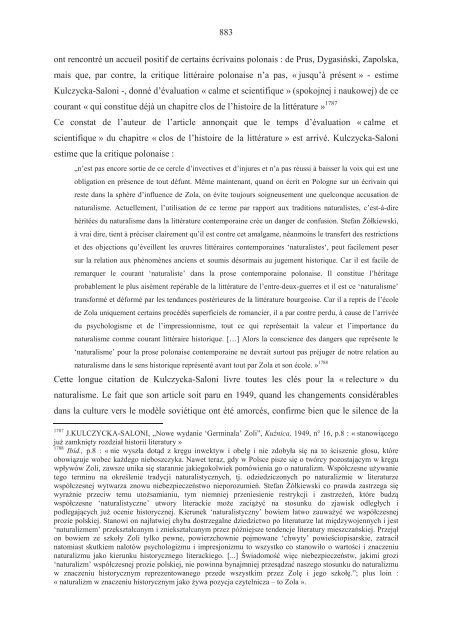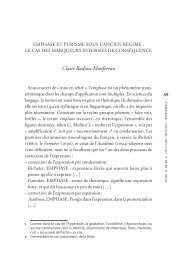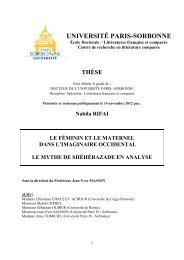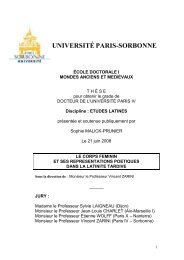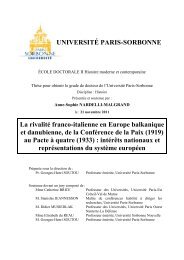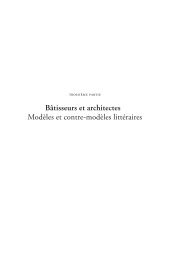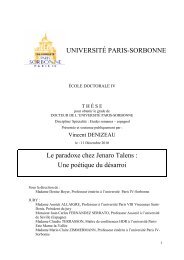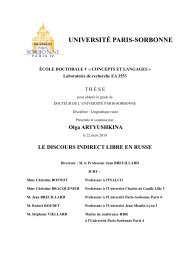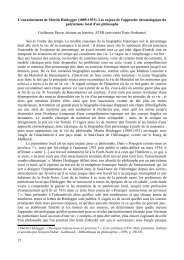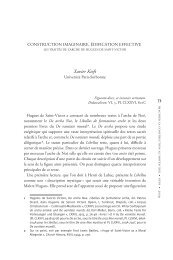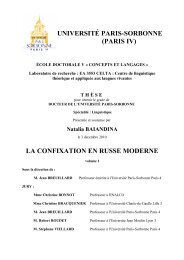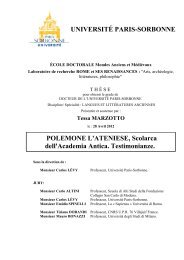- Page 1:
1 UNIVERSITÉ PARIS-SORBONNE ÉCOLE
- Page 5:
5 Remerciements Mes premiers remerc
- Page 9:
Résumé en anglais 9 The precise s
- Page 13 and 14:
13 Table des matières Résumé et
- Page 15 and 16:
15 Liste de sigles et abréviations
- Page 17 and 18:
17 AVANT- PROPOS Le travail de rech
- Page 19 and 20:
19 recensant les parutions de 1947
- Page 21 and 22:
21 connaissances littéraires, d’
- Page 23 and 24:
Méthodologie 23 Introduction gén
- Page 25 and 26:
Y. Chevrel mentionne une autre diff
- Page 27 and 28:
27 référence implicite à sa prop
- Page 29 and 30:
29 Nouvelle historiographie du mond
- Page 31 and 32:
31 „Après 1989, on a assisté à
- Page 33:
33 d’expression était en partie
- Page 36 and 37:
36 Robert Dallek, dans son ouvrage
- Page 38 and 39:
38 et la vie politique de cette ré
- Page 40 and 41:
40 La première phase - l’expansi
- Page 42 and 43:
42 La pratique soviétique de la te
- Page 44 and 45:
44 d’autres déséquilibres dans
- Page 46 and 47:
46 base sociale dévouée» 73 qui
- Page 48 and 49:
48 des conflits consécutifs à la
- Page 50 and 51:
50 la mécanisation de l’agricult
- Page 52 and 53:
52 Dans les démocraties populaires
- Page 54 and 55:
54 réformes sociales. Le 27 juille
- Page 56 and 57:
56 milliers d’exploitations paysa
- Page 58 and 59:
58 la résistance (entre autres le
- Page 60 and 61:
60 Allemands ou contrôlées par le
- Page 62 and 63:
62 adultes étaient fichés ». 114
- Page 64 and 65:
64 étaient désignés de la même
- Page 66 and 67:
66 Rzeczpospolita Ludowa (PRL). A.
- Page 68 and 69:
68 L’Église catholique dans la P
- Page 70 and 71:
70 Le changement dans la vie cultur
- Page 72 and 73:
72 forçait à se positionner par r
- Page 74 and 75:
74 partir de 1950 son activité a
- Page 76 and 77:
76 devenir des guides spirituels de
- Page 78 and 79:
78 Le Dégel politique polonais a
- Page 80 and 81:
80 prison et libéré les prisonnie
- Page 82 and 83:
82 Sécurité Publique, certes réd
- Page 84 and 85:
La Propagande de la période stalin
- Page 86 and 87:
86 l’endoctrinement. La langue de
- Page 88 and 89:
La censure préventive 88 La censur
- Page 90 and 91:
90 propagande, de la politique étr
- Page 92 and 93:
92 La censure était omniprésente
- Page 94 and 95:
94 l’abandon du ‘grand réalism
- Page 96 and 97:
96 Turowicz, écrivait que l’Éta
- Page 98 and 99:
98 « La popularisation de la créa
- Page 100 and 101:
100 qu’ils en extraient les élé
- Page 102 and 103:
102 rapprochaient de plus en plus d
- Page 104 and 105:
104 Dans l’exposé de ółkiewski
- Page 106 and 107:
106 Le Congrès suivant du ZLP, le
- Page 108 and 109:
108 par l’organisation de nombreu
- Page 110 and 111:
110 réalisme socialiste a été la
- Page 112 and 113:
112 production « matérielle » de
- Page 114 and 115:
114 étaient encore peu présentes
- Page 116 and 117:
116 institutionnelle rapide des str
- Page 118 and 119:
118 GUKPPiW, des institutions cultu
- Page 120 and 121:
120 goût, ou jugées telles, mais
- Page 122 and 123:
122 Commission des Traductions et l
- Page 124 and 125:
124 des chiffres de diffusion. L’
- Page 126 and 127:
126 Trachtenberg. C’est à ce mom
- Page 128 and 129:
128 En ce qui concerne les littéra
- Page 130 and 131:
130 de la littérature allemande. P
- Page 132 and 133:
132 diffusion des livres sélection
- Page 134 and 135:
134 production des livres (la produ
- Page 136 and 137:
136 Berman 237 , chargé par le par
- Page 138 and 139:
138 Les négociations entre les All
- Page 140 and 141:
140 divergences sérieuses d’int
- Page 142 and 143:
142 éléments de l’économie de
- Page 144 and 145:
144 deux-guerres qui a laissé des
- Page 146 and 147:
146 culturels français dans les pa
- Page 148 and 149:
148 auparavant des lieux de formati
- Page 150 and 151:
150 des traditions ouvrières et de
- Page 152 and 153:
152 Les liens d’alliance et d’a
- Page 154 and 155:
154 L’Union soviétique comptait
- Page 156 and 157:
156 du monde en deux blocs ennemis
- Page 158 and 159:
158 l’Institut Français de Varso
- Page 160 and 161:
160 Les Polonais ont rencontré les
- Page 162 and 163:
162 président de la Société d’
- Page 164 and 165:
164 1948 du traité de l’Union Oc
- Page 166 and 167:
166 faire des séjours d’études
- Page 168 and 169:
168 signalent la nécessité de men
- Page 170 and 171:
170 relations économiques et cultu
- Page 172 and 173:
172 de France à Varsovie, des acti
- Page 174 and 175:
174 Les relations culturelles franc
- Page 176 and 177:
176 Néanmoins, Maria Pasztor tient
- Page 178 and 179:
178 Pasztor. Le « point 2a » que
- Page 180 and 181:
180 L’intérêt croissant pour la
- Page 182 and 183:
182 caractère omniprésent. « Les
- Page 184 and 185:
184 que le lecteur intégrera ses l
- Page 186 and 187:
186 lus à la tribune, les applaudi
- Page 188 and 189:
188 par le « Parti du prolétariat
- Page 190 and 191:
190 Un autre problème qui se manif
- Page 192 and 193:
192 « ne se serait sûrement pas f
- Page 194 and 195:
194 « La mort de Staline a pour ef
- Page 196 and 197:
196 Cette citation de Z. Jarosi ski
- Page 198 and 199:
198 politique ; le nombre de public
- Page 200 and 201:
Le programme du réalisme socialist
- Page 202 and 203:
202 Jdanov 358 est un violent rappe
- Page 204 and 205:
204 Le réalisme socialiste fait of
- Page 206 and 207:
206
- Page 208 and 209:
208 Pour prendre connaissance des t
- Page 210 and 211:
210 Bund 374 , il participe à la r
- Page 212 and 213:
212 « Le réalisme socialiste est
- Page 214 and 215:
Lukács et le naturalisme 214 Une a
- Page 216 and 217:
216 Robin, « le fossé semble éno
- Page 218 and 219:
218 Lifschitz. Son prestige intelle
- Page 220 and 221:
220 une œuvre artistique consistai
- Page 222 and 223:
222 Lukács illustre ses réflexion
- Page 224 and 225:
224 Claude Prévost considère que
- Page 226 and 227:
226 Marx partageait avec Engels son
- Page 228 and 229:
228 La question : « quels écrivai
- Page 230 and 231:
230 présente une analyse comparée
- Page 232 and 233:
232 genèse du roman de Walter Scot
- Page 234 and 235:
234 l’histoire, détache les dest
- Page 236 and 237:
236 d’autocritiques. Comme, par e
- Page 238 and 239:
238 La présentation de Michel Auco
- Page 240 and 241:
240 œuvre réaliste pouvait être
- Page 242 and 243:
242 fait, de 1935 à 1940, il suit
- Page 244 and 245:
244 lorsque celle-ci se déclare so
- Page 246 and 247:
246 Par la suite, Lukács a reproch
- Page 248 and 249:
248 Comme raison de sa disgrâce en
- Page 250 and 251:
250 entretenait avec les milieux co
- Page 252 and 253:
252 Et moi aussi, sans doute, je de
- Page 254 and 255:
254 Les opinions tranchées de G. W
- Page 256 and 257:
256 manière extrêmement directe
- Page 258 and 259:
258 intitulé » Chłopi» Balzaka
- Page 260 and 261:
260 Cette petite note de la rédact
- Page 262 and 263:
262 Les numéros 23 et 24 de 1948 d
- Page 264 and 265:
264 « Je vous l’accorde, dans au
- Page 266 and 267:
266
- Page 268 and 269:
268 plus particulièrement, donne
- Page 270 and 271:
270 Mariusz Zawodniak, dans sa cont
- Page 272 and 273:
272 1941 à Lwów - à l’époque
- Page 274 and 275:
274 l’intelligentsia attirés par
- Page 276 and 277:
276 « On faisait taire - comme met
- Page 278 and 279:
278 monde communiste, pour « broui
- Page 280 and 281:
280 Le fait qu’une revue marxiste
- Page 282 and 283:
282 Le deuxième numéro d’Odrodz
- Page 284 and 285:
284 fait d’évoquer la vie litté
- Page 286 and 287:
286 réformes radicales. La situati
- Page 288 and 289:
288 On peut penser que Wa yk veut d
- Page 290 and 291:
290 idéologiques déterminés, s
- Page 292 and 293:
292 participation de l’intelligen
- Page 294 and 295:
294 d’ordre principal le souci de
- Page 296 and 297:
296 encore imparfaite, incomplète,
- Page 298 and 299:
298 une peur imposée qui ne vous q
- Page 300 and 301:
300 L’intérêt porté à la thé
- Page 302 and 303:
302 Wyka avance la thèse selon laq
- Page 304 and 305:
Positions des critiques catholiques
- Page 306 and 307:
306 Kisielewski accorde ainsi aux l
- Page 308 and 309:
308 a-t-elle fait son temps ? Il se
- Page 310 and 311:
310 manque des personnages et des p
- Page 312 and 313:
312 marquait la fin de l’étape
- Page 314 and 315:
314 critiques de Ku nica, dans lesq
- Page 316 and 317:
316 affaire aussi digne d’une lut
- Page 318 and 319:
318 du réalisme dans l’ensemble
- Page 320 and 321:
320 Le débat sur le réalisme dans
- Page 322 and 323:
322 « Achille était courageux, Ag
- Page 324 and 325:
324 Dans un autre article, intitul
- Page 326 and 327:
326 Kisielewski s’oppose d’embl
- Page 328 and 329:
328 manifestées lors du processus
- Page 330 and 331:
330 soviétiques en 1934, la Pravda
- Page 332 and 333:
332 formalisme, etc., dont même le
- Page 334 and 335:
334 tourné vers le roman réaliste
- Page 336 and 337:
336 La représentation véridique n
- Page 338 and 339:
338 de Ku nica n’a pas suivi Luk
- Page 340 and 341:
340 l’Histoire. C’est ce que Lu
- Page 342 and 343:
342 La formation du canon littérai
- Page 344 and 345:
344 Il souligne que la spécificit
- Page 346 and 347:
346 nécessaire pour son fonctionne
- Page 348 and 349:
348 Elle cite un commentaire désab
- Page 350 and 351:
350 par Ludwik Wary ski en août 18
- Page 352 and 353:
352 quotidienne. Et pour cette rais
- Page 354 and 355:
354 s’exprime de manière éviden
- Page 356 and 357:
356 en 1945 - même pour les critiq
- Page 358 and 359:
358 ou formels serait une absurdit
- Page 360 and 361:
360 cités à plusieurs reprises, J
- Page 362 and 363:
362 conviction, déjà commentée p
- Page 364 and 365:
364 Kazimierz Wyka, mettant en dout
- Page 366 and 367:
366 vraisemblance et de la réalit
- Page 368 and 369:
368 « […] cette aile des créate
- Page 370 and 371:
Le réalisme critique - le positivi
- Page 372 and 373:
372 Le grand article d’Andrzej St
- Page 374 and 375:
374 créé des modes, des mœurs. L
- Page 376 and 377:
376 des erreurs monumentales, d’a
- Page 378 and 379:
378 „La critique et la négation
- Page 380 and 381:
380 laborieusement, et souvent d’
- Page 382 and 383:
382 1863 [après l’Insurrection d
- Page 384 and 385:
384 Lalka, présentée par Jan Kott
- Page 386 and 387:
386 influence, perçue comme néfas
- Page 388 and 389:
388 d’une plus grande concentrati
- Page 390 and 391:
390 Avec la parution des œuvres pu
- Page 392 and 393:
392 monsieur kjw) s’attachaient
- Page 394 and 395:
394 Kott défendait l’idée de «
- Page 396 and 397:
396 Conrad. Mais il faut surmonter
- Page 398 and 399:
398 „Depuis dix ans, à part le s
- Page 400 and 401:
400 „Il suffit de comparer l’é
- Page 402 and 403:
402 du départ, notre matière de c
- Page 404 and 405:
404 partie. Le climat des discussio
- Page 406 and 407:
406 critiques, sur les travaux des
- Page 408 and 409:
408 extraire les meilleures utilit
- Page 410 and 411:
410 Wa yk a observé qu’au cours
- Page 412 and 413:
412 Ce qui a pu être toléré pend
- Page 414 and 415:
414 Hanna Gosk, auteur d’une mono
- Page 416 and 417:
416 dispositif qui correspondait à
- Page 418 and 419:
418 classiques qui forment toujours
- Page 420 and 421:
420 et du vocabulaire de tous les g
- Page 422 and 423:
422 l’époque de l’après-guerr
- Page 424 and 425:
424 Le but de cette liste, comme l
- Page 426 and 427:
426 Les Caractères de La Bruyère
- Page 428 and 429:
428 développé, jusqu’en 1950, d
- Page 430 and 431:
430 Kott reconnaissait que c’éta
- Page 432 and 433:
432 certains romans, a fait des pro
- Page 434 and 435:
434 littérature positiviste. De la
- Page 436 and 437:
436 „Le dilemme du livre en Polog
- Page 438 and 439:
438 réalité, tout en gardant les
- Page 440 and 441:
440 „ Jan Kott ! Où est la centa
- Page 442 and 443:
442 éditeurs privés qu’on accus
- Page 444 and 445:
444 Ils constituaient - estime-t-il
- Page 446 and 447:
446 traductions des œuvres anglais
- Page 448 and 449:
448 Ku nica qui s’est attelé à
- Page 450 and 451:
450 baisse des rééditions par rap
- Page 452 and 453:
452 les Œuvres choisies (Izbrannye
- Page 454 and 455:
454 sobranie so inenij - Œuvres co
- Page 456 and 457:
456
- Page 458 and 459:
458 Comme nous avons pu le voir dan
- Page 460 and 461:
460 particulièrement dans la parti
- Page 462 and 463:
462 supplément destiné aux enfant
- Page 464 and 465:
464 Meditationes de prima philosoph
- Page 466 and 467:
466 « Est-ce que Le Cid est une œ
- Page 468 and 469:
468 qui célébrait le 325 e annive
- Page 470 and 471:
470 „Il a montré le vrai Molièr
- Page 472 and 473:
472
- Page 474 and 475:
474 réédition, par « Wiedza »,
- Page 476 and 477:
476 besoin pour « démocratiser »
- Page 478 and 479:
478 Comme nous avons déjà expliqu
- Page 480 and 481:
480 de l’après-guerre par les cr
- Page 482 and 483:
482 littérature française de la m
- Page 484 and 485:
484 Un autre éclairage est apport
- Page 486 and 487:
486 nous l’avons déjà vu. Il co
- Page 488 and 489:
488 siècle des Lumières y était
- Page 490 and 491:
490 du comité collectif de rédact
- Page 492 and 493:
492 „L’idéologie et le program
- Page 494 and 495:
494 Lumières qui avait également
- Page 496 and 497:
496 faire avancer le projet culture
- Page 498 and 499:
498 jugée brutale par certains his
- Page 500 and 501:
500 L’auteur s’est positionné
- Page 502 and 503:
502 Le critique accusait la prédom
- Page 504 and 505:
504 À la lumière de la critique m
- Page 506 and 507:
506 période athée du philosophe q
- Page 508 and 509:
508 Mais la route qu’il choisit e
- Page 510 and 511:
510 écrit-il. Et les protestations
- Page 512 and 513:
512 les femmes dans la position hum
- Page 514 and 515:
514 Le problème du réalisme dans
- Page 516 and 517:
516 „Diderot anticipe, avec cette
- Page 518 and 519:
518 salées, plaçait des traités
- Page 520 and 521:
520 pendant la période de 1944 à
- Page 522 and 523:
522 philosophiques. Dans certains d
- Page 524 and 525:
524 l’évolution de la situation
- Page 526 and 527:
526 temps, et soulignaient l’impo
- Page 528 and 529:
528 certes utopique mais historique
- Page 530 and 531:
530 ce sujet dans La sainte Famille
- Page 532 and 533:
532 russe par Goslitizdat en 1936 e
- Page 534 and 535:
534 modeste : en 1946, deux article
- Page 536 and 537:
536 À ce jugement sévère sur le
- Page 538 and 539:
538 pour la société. Ku nica, en
- Page 540 and 541:
540 Ainsi l’œuvre de Voltaire, c
- Page 542 and 543:
542 de Chamfort, suivies de dialogu
- Page 544 and 545:
544 „Toutes les œuvres de Chamfo
- Page 546 and 547:
546 de l’écrivain dans les vingt
- Page 548 and 549:
548 publication par Goslitizdat en
- Page 550 and 551:
550
- Page 552 and 553:
552 et, après la rencontre à Szkl
- Page 554 and 555:
554 Lukács a basé sa définition
- Page 556 and 557:
556 futurs romans polonais. Comme n
- Page 558 and 559:
558 critique de Stendhal », écrit
- Page 560 and 561:
560 expliquer et illustrer les conc
- Page 562 and 563:
562 au détriment de l’approche s
- Page 564 and 565:
564 Par la suite, et également dan
- Page 566 and 567:
566 soviétique, après la consolid
- Page 568 and 569:
568 Père Goriot (texte intégral)
- Page 570 and 571:
570 signalons des publications de B
- Page 572 and 573:
572 réalité. L’écrivain perço
- Page 574 and 575:
574 À la fin de son article, Boy r
- Page 576 and 577:
576 étrangères. Il considérait q
- Page 578 and 579:
578 soulignait la méthode propre
- Page 580 and 581:
580 dignité « du prince et du com
- Page 582 and 583:
582 La revue littéraire Twórczo a
- Page 584 and 585:
584 de la bourgeoisie française de
- Page 586 and 587:
586 Ce commentaire, écrit en 1948
- Page 588 and 589:
588 La longueur de cette citation s
- Page 590 and 591:
590 d’avoir négligé la littéra
- Page 592 and 593:
592 succès des « grands maîtres
- Page 594 and 595:
594 dans la version « réactionnai
- Page 596 and 597:
596 Les rééditions de Flaubert da
- Page 598 and 599:
598 désormais le symbole du philis
- Page 600 and 601:
600 Wat développe une réflexion s
- Page 602 and 603:
602 L’auteur de l’article évoq
- Page 604 and 605:
604 font sentir des pulsations viol
- Page 606 and 607:
606 « classiques ». La première
- Page 608 and 609:
608 150 000 exemplaires), les Œuvr
- Page 610 and 611:
610 véritablement populaire et uti
- Page 612 and 613:
612 Réception d’Eugène Sue - ba
- Page 614 and 615:
614 contemporain de Nekrasov qui au
- Page 616 and 617:
616 et La Cousine Bette en 1948, pu
- Page 618 and 619:
Réception de l’existentialisme 6
- Page 620 and 621:
620 grecques qui mettent en avant l
- Page 622 and 623:
622 de l’article. Et elle attire
- Page 624 and 625:
624 je ne vous dirai rien sur la ra
- Page 626 and 627:
626 ses derniers développements re
- Page 628 and 629:
628 Enfin, le numéro 51/52 proposa
- Page 630 and 631:
630 l’existentialisme veut jouer
- Page 632 and 633:
632 cerveaux anarchisant et rebelle
- Page 634 and 635:
634 soviétique, se référant au t
- Page 636 and 637:
636 La critique soviétique consid
- Page 638 and 639:
638 Le numéro 25 d’Odrodzenie ap
- Page 640 and 641:
640 qui ne recule devant rien ». L
- Page 642 and 643:
642 philosophiques. A première vue
- Page 644 and 645:
644 le concerne aucunement, ce qui
- Page 646 and 647:
646 entendu, les quelques heureux c
- Page 648 and 649:
648 critiques, certes, mais qui ont
- Page 650 and 651:
650 Decour, que les Allemands ont f
- Page 652 and 653:
652 André Gide ; à partir de 1936
- Page 654 and 655:
654 L’article évoque le sort de
- Page 656 and 657:
656 que Paris est l’unique appui
- Page 658 and 659:
658 La perspective tracée est cell
- Page 660 and 661:
660 son caractère massif, mais ég
- Page 662 and 663:
662 d’Aragon et Elsa Triolet à M
- Page 664 and 665:
664 qui a certes apporté la libér
- Page 666 and 667:
666 Une autre nouvelle du même rec
- Page 668 and 669:
668 numéro 274 du 9 septembre des
- Page 670:
670
- Page 673 and 674:
673 accessibles aux lecteurs polona
- Page 675 and 676:
675
- Page 677 and 678:
677 soviétiques signalent la parut
- Page 679 and 680:
679 Jakubiszyn s’inspire donc d
- Page 681 and 682:
681 jeune d’une génération, ira
- Page 683 and 684:
683 Balzac, le sceptique Anatole Fr
- Page 685 and 686:
685 « bourgeois » et les historie
- Page 687 and 688:
687 urowski évoque aussi la vision
- Page 689 and 690:
689 Attribuer à Rabelais le qualif
- Page 691 and 692:
691 « Des impulsions d’ordre dif
- Page 693 and 694:
693 l’objet d’une vigilance par
- Page 695 and 696:
695 donc : « corrections p. 3 et 4
- Page 697 and 698:
Descartes Jan Kott écrivait en 194
- Page 699 and 700:
699 de l’apathie, dont la bourgeo
- Page 701 and 702:
701 donc j’écris’, l’univers
- Page 703 and 704:
703 Les larges extraits de l’arti
- Page 705 and 706:
705 révolutionnaire ; dès l’ori
- Page 707 and 708:
707 Il ne faut pourtant pas ignorer
- Page 709 and 710:
709 précieux. Les résultats que l
- Page 711 and 712:
711 Les Maximes et réflexions mora
- Page 713 and 714:
713 La maison d’édition « Ossol
- Page 715 and 716:
715 son œuvre. Ainsi, le combat d
- Page 717 and 718:
717 l’intensité de ses sentiment
- Page 719 and 720:
719 temps (l’année 1951) repéra
- Page 721 and 722:
721 littérature avec la méthode m
- Page 723 and 724:
723 de la valeur d’information du
- Page 725 and 726:
725 Maupassant, Anatole France. Ell
- Page 727 and 728:
727 La sélection et le choix du mo
- Page 729 and 730:
729 Deuxième partie : Réception C
- Page 731 and 732:
731 Nous partageons l’opinion de
- Page 733 and 734:
733 plusieurs domaines de notre vie
- Page 735 and 736:
735 Lumières, avait été « repar
- Page 737 and 738:
737 Et il ajoute la précision suiv
- Page 739 and 740:
739 écrit entre 1773 et 1775, publ
- Page 741 and 742:
741 La première phrase, et surtout
- Page 743 and 744:
743 „Les oeuvres romanesques de l
- Page 745 and 746:
745 En ce qui concerne Le Paradoxe
- Page 747 and 748:
747 La traduction de La Religieuse
- Page 749 and 750:
749 sensibilité préromantique, en
- Page 751 and 752:
751 Jan Kott, auteur de la préface
- Page 753 and 754:
753 Elle esquisse la naissance de l
- Page 755 and 756:
755 guerre. Des auteurs polonais, e
- Page 757 and 758:
757 « nouvelle » société. L’a
- Page 759 and 760:
759 l’actualité des œuvres de V
- Page 761 and 762:
761 système féodal, en montrant s
- Page 763 and 764:
763 sur les finalités de la socié
- Page 765 and 766:
765 En traduisant le rapport, nous
- Page 767 and 768:
767 nous allons le voir, par le cen
- Page 769 and 770:
769 « Lesage ridiculise et montre
- Page 771 and 772:
771 Toutes les éditions et les ré
- Page 773 and 774:
773 de la littérature à l’époq
- Page 775 and 776:
775 France du XVIIe siècle, parue
- Page 777 and 778:
777 qualité et leur fiabilité. Et
- Page 779 and 780:
779 Deuxième partie : Réception C
- Page 781 and 782:
781 Dans la troisième édition, à
- Page 783 and 784:
783 Dans la troisième édition - r
- Page 785 and 786:
785 sur l’exemple de la littérat
- Page 787 and 788:
787 dont une grande partie se passe
- Page 789 and 790:
789 Les écrivains bourgeois de cet
- Page 791 and 792:
791 Le conte philosophique combatta
- Page 793 and 794:
793 Swift que nous voulons déchiff
- Page 795 and 796:
795 religieux, didactique et sociau
- Page 797 and 798:
797 Kott concernant les description
- Page 799 and 800:
799 Dans Le Neveu de Rameau 1645 ,
- Page 801 and 802:
801 Était-ce déjà l’annonce de
- Page 803 and 804:
803 essayaient de nous le faire cro
- Page 805 and 806:
805 poids des traditions les géné
- Page 807 and 808:
807 Diderot est accusé d’avoir p
- Page 809 and 810:
809 Le début des Lumières en Fran
- Page 811 and 812:
811 « L’Encyclopédie représent
- Page 813 and 814:
813 Angleterre - par un processus p
- Page 815 and 816:
815 puisse les éclairer. La réfle
- Page 817 and 818:
817 cruauté de l’accumulation pr
- Page 819 and 820:
819 « Les succès de la littératu
- Page 821 and 822:
821 populaires pour l’hégémonie
- Page 823 and 824:
823 siècle, par la conception de d
- Page 825 and 826:
825 Prévost s’en prennent justem
- Page 827 and 828:
827 du caractère progressiste dans
- Page 829 and 830:
829 Cette partie descriptive, qui o
- Page 831 and 832: 831 Le censeur exprime l’idée qu
- Page 833 and 834: 833 Deuxième partie : Réception C
- Page 835 and 836: 835 de Victor Hugo - un titre en 19
- Page 837 and 838: 837 rééditions des œuvres de la
- Page 839 and 840: 839 d’épreuves du plus grand rom
- Page 841 and 842: 841 Hertz insiste sur le fait que
- Page 843 and 844: 843 « L’œuvre de Balzac est né
- Page 845 and 846: 845 accusait l’écrivain françai
- Page 847 and 848: 847 intérêts des magnats de la fi
- Page 849 and 850: 849 anniversaire de la mort de Balz
- Page 851 and 852: 851 avec des tirages importantes (
- Page 853 and 854: 853 qui dépasse le cadre de notre
- Page 855 and 856: 855 pas dire que son étude a été
- Page 857 and 858: 857 La proposition de Zimand s’es
- Page 859 and 860: 859 « Je n’ai pas lu la monograp
- Page 861 and 862: 861 articles consacrés à Balzac,
- Page 863 and 864: 863 l’Internationale des Patriote
- Page 865 and 866: 865 c) en province - à partir de j
- Page 867 and 868: 867 c) le 17 mars - Soirée Littér
- Page 869 and 870: 869 autre a soulevé le problème d
- Page 871 and 872: 871 A la page 41, Kott, admirateur
- Page 873 and 874: 873 l’importance du riche legs de
- Page 875 and 876: 875 Il est difficile d’imaginer l
- Page 877 and 878: 877 „Les cosmopolites français,
- Page 879 and 880: 879 premier, signé par Maria Morst
- Page 881: 881 Cette divergence d’idéaux r
- Page 885 and 886: 885 mineurs, avec l’abondance de
- Page 887 and 888: 887 Tygodnik Powszechny, l’hebdom
- Page 889 and 890: 889 « Le roman naturaliste lié pa
- Page 891 and 892: 891 La réception, impressionnante
- Page 893 and 894: 893 existe des auteurs russes des r
- Page 895 and 896: 895 des années cinquante. En 1955,
- Page 897 and 898: 897 Deuxième partie : Réception C
- Page 899 and 900: 899 route et a pratiqué la politiq
- Page 901 and 902: 901 mieux des différences séparan
- Page 903 and 904: 903 plus lues et l’auteur du Pays
- Page 905 and 906: 905 Flaubert, Zola et Romain Rollan
- Page 907 and 908: 907 des associations issues de la R
- Page 909 and 910: 909 Ils rappellent que les directiv
- Page 911 and 912: 911 Gisèle Sapiro considère que c
- Page 913 and 914: 913 Paris une aventure individuelle
- Page 915 and 916: 915 « Ce dont je me souviens, c’
- Page 917 and 918: Réception française des Communist
- Page 919 and 920: 919 « Le 17 juin 1949 à la Salle
- Page 921 and 922: 921 voilà comment l’auteur de l
- Page 923 and 924: 923 peuvent se mettre en grève pou
- Page 925 and 926: 925 trouve à la source d’un imme
- Page 927 and 928: 927 connaissance des questions d’
- Page 929 and 930: 929 Pologne.» 1899 , Głos Nauczyc
- Page 931 and 932: 931 subordination de la création a
- Page 933 and 934:
933 ce qu’elles apportaient comme
- Page 935 and 936:
935 Les Communistes « roman-fresqu
- Page 937 and 938:
937 Le reproche principal du censeu
- Page 939 and 940:
939 l’énorme importance des init
- Page 941 and 942:
941 Tout cela donne un roman d’un
- Page 943 and 944:
943 au centre du roman le PCF - Ara
- Page 945 and 946:
945 Conclusion « Publier une tradu
- Page 947 and 948:
947 en Pologne, mais les „classiq
- Page 949 and 950:
949 expliquer aux lecteurs - la nou
- Page 951 and 952:
Documents d’archives 951 Bibliogr
- Page 953 and 954:
953 - P.GERBET, La coupure de l’E
- Page 955 and 956:
955 - La Pologne, sous la dir. de F
- Page 957 and 958:
957 - T. KISIELEWSKI, Pa dziernik 1
- Page 959 and 960:
959 - G. WOŁOWIEC, Nowocze ni w PR
- Page 961 and 962:
961 - W. TOMASIK, Polska powie tend
- Page 963 and 964:
ANNEXE 1 : Les traductions polonais
- Page 965 and 966:
NOM AUTEUR PRENOM TITRE Français T
- Page 967 and 968:
NOM AUTEUR PRENOM TITRE Français T
- Page 969 and 970:
NOM AUTEUR PRENOM TITRE Français T
- Page 971 and 972:
971 NOM AUTEUR PRENOM TITRE França
- Page 973 and 974:
NOM AUTEUR PRENOM TITRE Français T
- Page 975 and 976:
975 NOM AUTEUR PRENOM TITRE França
- Page 977 and 978:
977 NOM AUTEUR PRENOM TITRE França
- Page 979 and 980:
979 NOM AUTEUR PRENOM TITRE França
- Page 981 and 982:
981 NOM AUTEUR PRENOM TITRE França
- Page 983 and 984:
NOM AUTEUR PRENOM TITRE Français T
- Page 985 and 986:
ANNEXE 2 : 985 Les traductions polo
- Page 987 and 988:
1948 DESCARTES René Meditationes d
- Page 989 and 990:
1949 FRANCE Anatole Le Livre de mon
- Page 991 and 992:
1950 FLAUBERT Gustave Salammbô Sal
- Page 993 and 994:
1951 MERIMEE Prosper Carmen ; Les A
- Page 995 and 996:
1952 PHILIPPE André Michel Rondet
- Page 997 and 998:
1953 VOLTAIRE F.M.A. de Le Monde co
- Page 999 and 1000:
1955 BALZAC Honoré de Eugenie Gran
- Page 1001 and 1002:
1956 FRANCE Anatole Histoire contem
- Page 1003 and 1004:
Résumé en français 7 La récepti


